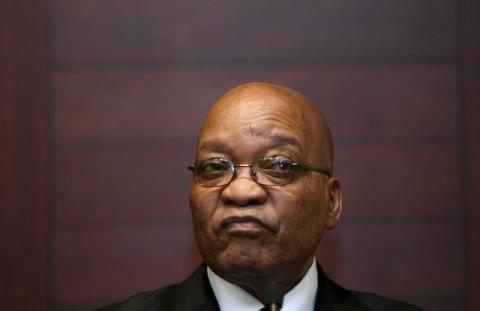Advertisement
South Africa local government vote in August a test for Zuma
JOHANNESBURG (Reuters) - South Africa will hold local government elections on Aug. 3, President Jacob Zuma said on Wednesday, in what looks likely to become a referendum on his leadership after an attempt to impeach him and mounting concern about weak economic growth.
This year's local elections pose a major risk for Zuma's dominant ruling African National Congress, with the party facing a strong challenge from opponents seeking to capitalize on what they see as Zuma's missteps.
Any defeats in the big population centers for the ANC, which counts on rural areas for the bulk of its support, could damage the party that has been in power since the end of white-minority rule in 1994 as it gears up for a presidential election in 2019.
Zuma is unable to stand in that vote after completing two terms but is likely to be influential behind the scenes in picking a new ANC leader at a conference in 2017, even though calls are already growing for him to step down.
The elections will choose provincial officials, metropolitan and local municipal councils and mayors.
The opposition aims to wrestle control of the commercial hub Johannesburg and capital Pretoria from the ANC, as well as urban centers where anger has risen against the ruling party.
"So yes, it's on the 3rd of August that we deal decisively with ZANC (Zuma's ANC)," Mmusi Maimane, leader of the Democratic Alliance, the biggest opposition party, said on Twitter.
The firebrand leader of the leftist Economic Freedom Fighters, Julius Malema, also tweeted that his party was "ready to contest these elections".
"PERSONAL VENDETTAS"
At a media briefing in downtown Johannesburg on Tuesday, churches, trade unions and civil rights groups increased the rhetoric against the president, while an ANC branch in the city also urged him to resign.
"People are feeling pain. Anger and urgency is growing," the groups said in a joint statement, calling for protests against Zuma. It was not immediately clear how much support the groups had.
Zuma's son Edward backed his father, saying there was a conspiracy to force the president from his office.
"We know it's only not about the well being of the country ... its about merely personal vendettas that they have against the president of the country," Edward Zuma said in an interview with ENCA television station.
"They have tried many tricks in the book, they have failed," he said of the people who have called on Zuma to resign.
He survived impeachment on Tuesday thanks to the ANC's big majority in the 400-seat assembly. Zuma had faced censure after the constitutional court ruled that he breached the constitution by ignoring an order to repay some of the $16 million in state funds spent renovating his home.
He alarmed investors and caused the rand to tumble in December when he replaced former finance minister Nhlanhla Nene with David van Rooyen, a little-known politician. Under a barrage of criticism, he replaced van Rooyen just days later with Pravin Gordhan, who had held the job from 2009 to 2014.
The announcement of the date for the elections also comes at a time when Africa's most industrialized economy is struggling. Its currency has lost 4 percent to the dollar so far this year, the central bank has forecast growth of 0.8 percent and unemployment is at 25 percent.
That, on the back of the political developments, has stirred fears of a downgrade by ratings agencies to "junk" status. S&P and Fitch currently rate South Africa's debt just one notch above sub-investment grade. Moody's has it two notches above junk, but on review for a downgrade.
(Additional reporting by Olivia Kumwenda-Mtambo; Writing by James Macharia; Editing by Alison Williams)



















Add new comment